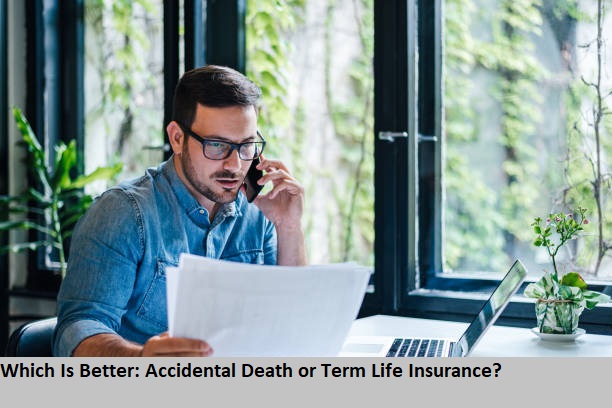Which Is Better: Accidental Death or Term Life Insurance?
Introduction:
In this article, we will delve into a critical insurance dilemma: the choice between Accidental Death Insurance and Term Life Insurance. Both of these policies serve as protective shields for the unexpected, but they cater to different aspects of life's uncertainties. Accidental Death Insurance is designed to provide financial support in the event of accidental fatalities, while Term Life Insurance offers broader protection, covering a specified term and a wide range of potential causes of death. The decision to opt for one over the other depends on individual circumstances, financial goals, and risk tolerance. We will explore the key differences between these insurance types, the advantages and limitations of each, and help you make an informed choice to secure your family's financial future in a way that aligns with your unique needs and preferences.
- Accidental Death Insurance vs. Term Life Insurance: Key Differences
- Coverage Scope: Understanding the Limits of Each Policy
- Premium Costs and Affordability Considerations
- Determining Your Insurance Needs and Risk Profile
- Flexibility and Customization in Policy Features
- Making an Informed Decision: Which Insurance is Right for You?
Accidental Death Insurance vs. Term Life Insurance: Key Differences:
Accidental Death Insurance and Term Life Insurance are distinct policy types, and understanding their fundamental differences is crucial when deciding between them. Accidental Death Insurance exclusively covers fatalities resulting from accidents. It does not provide coverage for deaths due to illnesses or natural causes. In contrast, Term Life Insurance offers a broader scope of coverage, encompassing a defined period (the term) and various causes of death, including both accidents and illnesses.
Coverage Scope: Understanding the Limits of Each Policy:
Accidental Death Insurance has limited coverage and is not as comprehensive as Term Life Insurance. While it can be cost-effective and suitable for individuals with high accident risk, it does not offer protection against non-accidental deaths, which account for the majority of fatalities. Term Life Insurance, on the other hand, offers comprehensive coverage, making it suitable for those seeking to protect their loved ones from a wide range of life's uncertainties. It ensures financial security in case of both accidental and non-accidental deaths, providing peace of mind for the policyholder and their beneficiaries.
Premium Costs and Affordability Considerations:
The cost of insurance is a critical factor to consider when deciding between Accidental Death and Term Life Insurance. Accidental Death Insurance tends to have lower premiums because of its limited scope. However, it's essential to recognize that this affordability comes at the expense of reduced coverage. Term Life Insurance premiums may be higher, but they offer more extensive protection. When assessing affordability, it's important to align the premium costs with your budget while considering the level of financial security you want to provide for your family.
Determining Your Insurance Needs and Risk Profile:
Your specific insurance needs and risk profile play a significant role in choosing between these two insurance options. If you have a high-risk occupation or lifestyle that makes you more prone to accidents, Accidental Death Insurance may be a valuable addition. However, if you are concerned about overall financial security and the well-being of your loved ones, Term Life Insurance provides a broader safety net. Additionally, consider your age, health, and family situation when evaluating your insurance needs and risk profile, as these factors can influence the choice that best suits you.
Flexibility and Customization in Policy Features:
Term Life Insurance typically offers more flexibility and customization options. Policyholders can choose the term length, coverage amount, and riders to tailor the policy to their specific requirements. This flexibility allows individuals to align the policy with their financial goals and family needs. In contrast, Accidental Death Insurance is relatively straightforward and less customizable. It primarily serves its defined purpose, which is to offer protection in the case of accidental deaths.
Making an Informed Decision:
Which Insurance is Right for You? Ultimately, making an informed decision between Accidental Death and Term Life Insurance requires a comprehensive assessment of your unique circumstances, priorities, and preferences. Consider the scope of coverage, premium costs, your risk profile, and the level of flexibility you desire in your policy. Weigh the advantages and limitations of each insurance type against your specific needs and the financial security you wish to provide for your loved ones. Consulting with an insurance advisor can be invaluable in guiding you toward the insurance option that aligns with your long-term financial goals and personal peace of mind. In the end, the choice between Accidental Death and Term Life Insurance should reflect your individual priorities and a well-balanced approach to managing life's uncertainties.
Conclusion:
I hope this comprehensive exploration of Accidental Death Insurance and Term Life Insurance has provided valuable insights to help you make an informed decision about which option suits your needs. The key differences between these policies, their coverage scope, affordability, and customization options all play a crucial role in determining which is the better choice for you.
In conclusion, the decision should be driven by your individual circumstances and priorities. If you're primarily concerned about accidental risks and are looking for a cost-effective solution, Accidental Death Insurance may suffice. However, if you seek comprehensive financial security for your loved ones, Term Life Insurance offers a broader safety net, covering both accidental and non-accidental deaths.
Whichever option you choose, it's essential to align it with your unique financial goals and family's needs. Consulting with an insurance professional can provide valuable guidance to ensure that your insurance decision is well-informed and tailored to your peace of mind and long-term security. Ultimately, the choice should reflect your individual priorities and your strategy for managing life's uncertainties.



Comments
Post a Comment